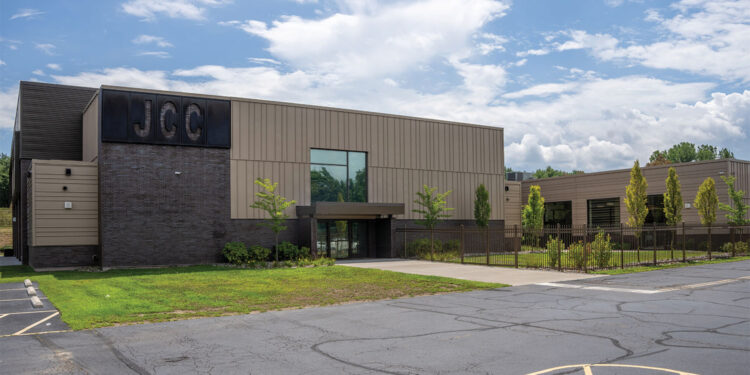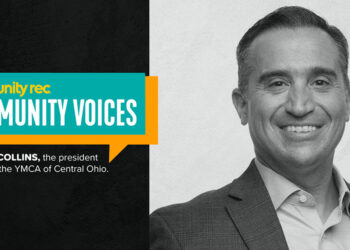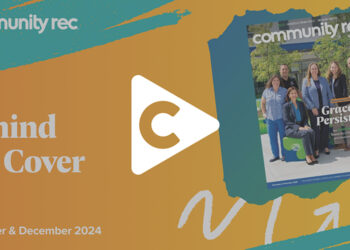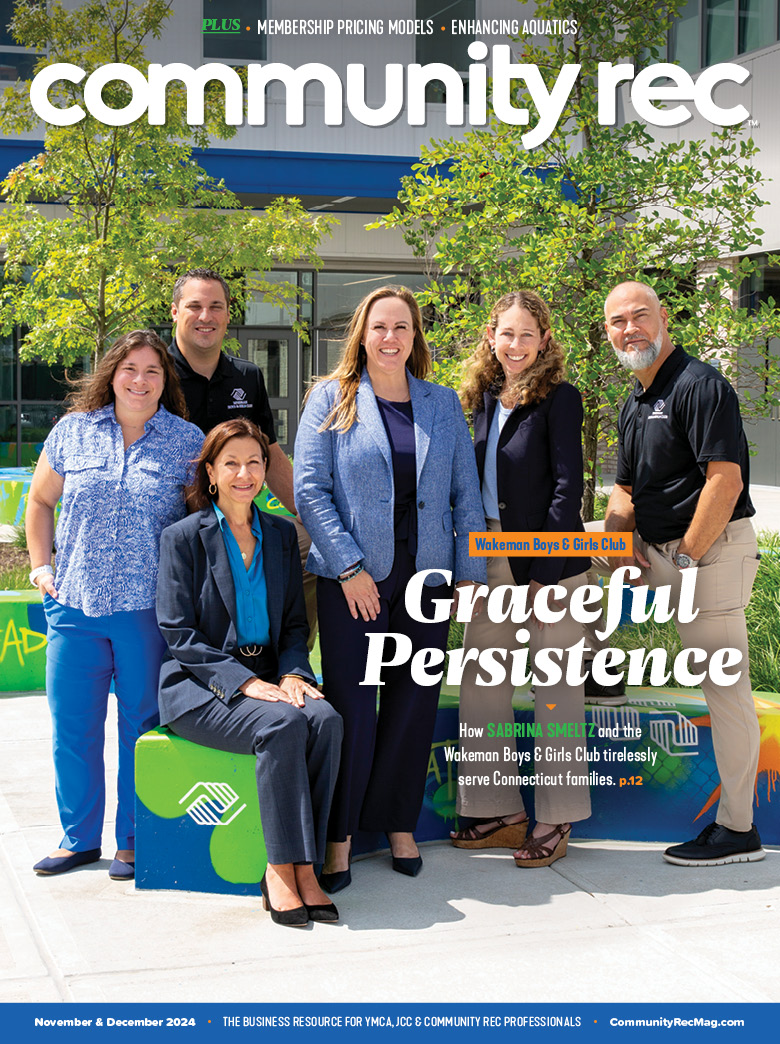Gary Bernstein, the CEO of the Jewish Community Alliance of Northeastern Pennsylvania, shares how the Sidney and Pauline Friedman JCC is centered on everyone.
In 2019, the Sidney and Pauline Friedman Jewish Community Center opened the doors to a brand new, vibrant 57,000-square-foot facility in Kingston, Pennsylvania, just across the river from its former location of nearly 75 years.
The new facility is housed on the 13.4-acre Weinberg Campus and features a 9,000-square-foot gym with multiple court sports, a state-of-the-art social hall, kitchen, the region’s premier early childhood education learning center, fully-equipped exercise rooms including a variety of cardio and weight equipment, locker rooms, a sauna and steam room, meeting rooms, a restaurant, weaving room, food pantry, plenty of parking, and more.
Gary Bernstein, the CEO of the Jewish Community Alliance of Northeastern Pennsylvania and the Friedman JCC, arrived shortly after the new facility opened. At the start of 2020, he brought a history of experience and an externally motivated mindset that guided the JCC through the pandemic, into a new capital campaign and has established the JCC as the “center for everyone” in the community.
The Traveler
Bernstein grew up on Long Island competing in Judo tournaments before studying physical education at Slippery Rock University with aspirations of becoming a gym teacher. Instead, a friend of his father — who worked for what was then called the Jewish Welfare Board — recommended he apply to work for a JCC after college. This led him to an interview with the executive director of the New Orleans JCC. When asked where he saw himself in 10 years, he said, “Sitting in your chair.”
“I wanted to reach the highest level of achievement,” said Bernstein. “I figured if I’m going to be in this field, I want to be all-in and I want to be the best I can be.”
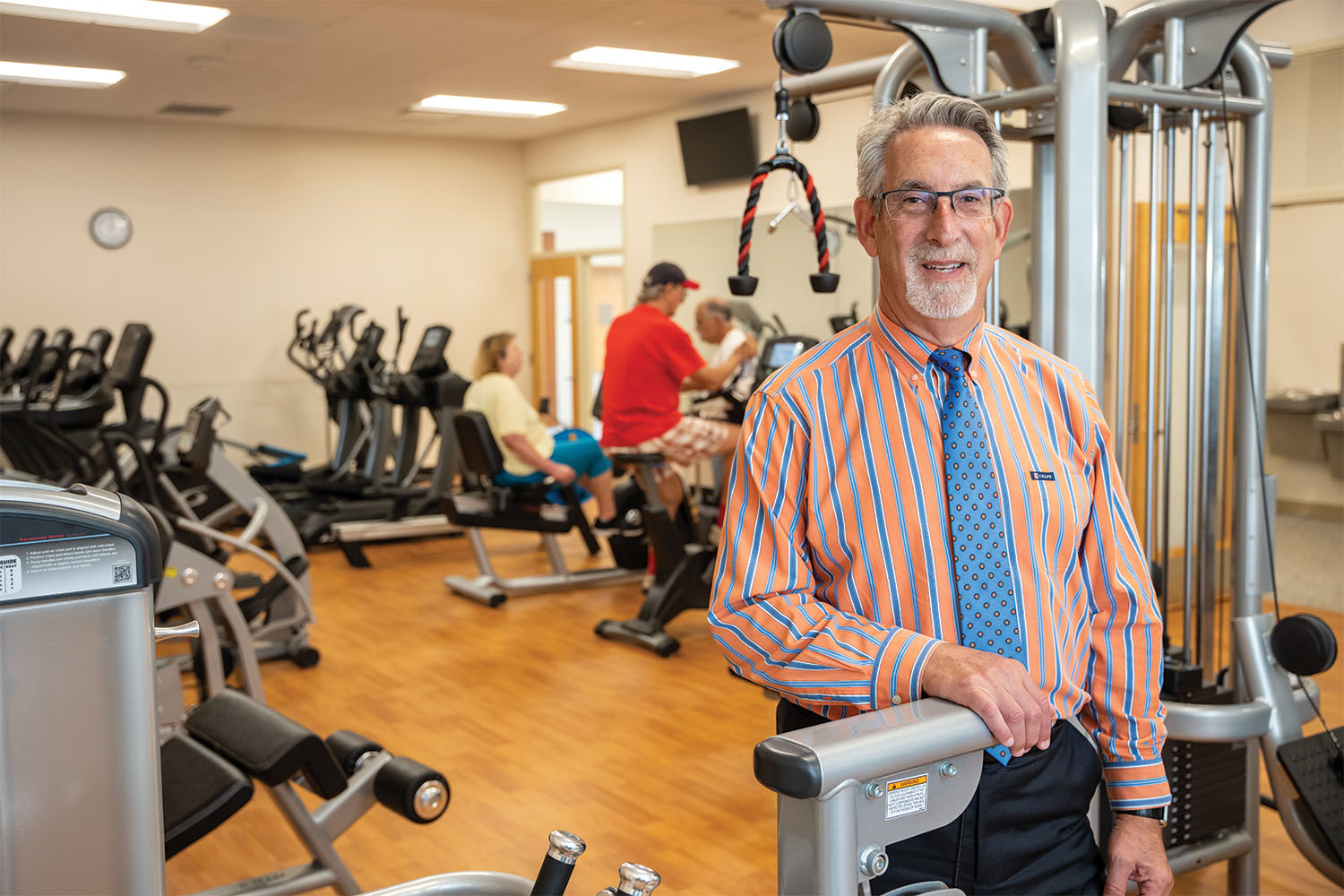
He took his first role at the New Orleans JCC in an athletics position and then went back to school to get his masters in sports administration. After school, he had intentions of teaching full-time. That was until the Dallas JCC reached out to him with a new opportunity.
While working at the Dallas JCC, Bernstein took on revamping the JCC Associations’ annual athletic conferences. He was asked to chair the conference and brought on new keynote speakers such as Dr. Kenneth Cooper, the president and founder of the Cooper Aerobics Center. Bernstein said this exposure led to calls from different centers asking him to become a JCC assistant director, which he did for eight years in Omaha, Nebraska, until at the age of 35 he landed his first role as a JCC executive director in Marblehead, Massachusetts.
With years of experience now under his belt, Bernstein was called upon to fundraise and build a new JCC in Albuquerque, New Mexico. “That was not the career path I had in mind,” he recalled. “But the opportunity to build something from scratch was very attractive to me. Developing the board, hiring the staff, creating the programs, fundraising — all of it was an experience you just can’t buy. The first year it was up and running we had about 1,500 family units. When I look back on that center going strong today, it shows you can take such pride in the work you do.”
Before finding his home at the Friedman JCC, Bernstein also led the Louisville JCC, taught sport management at the college level in Kentucky, Virginia and New York, ran a consulting business, and wrote a book called “Nonprofit Recreation and Sport Organization: Principles and Practices in Leadership and Management.”
Seeking a change of pace for his family, Bernstein found out the JCC in Northeastern Pennsylvania was looking for an executive. “One of the attractions for me to come here was the fact it was new and they needed someone to not build a center — because it was already built — but build the programs and the community,” he said.
And that’s exactly what Bernstein did, starting with a goal to meet 60 new people in 60 days.
Developing Relationships
When Bernstein arrived at the Friedman JCC, he said he wanted to start his position externally motivated, which meant going out into the community. He requested each person on the search committee and the board give him two to three names of people they thought he should meet with. During the meetings he would ask each person to tell him about the community, about their agency, how they could work together and what they could partner on.
“I became familiar with state and federal lawmakers, sat down with various executives and social organization leaders, and joined boards of directors wherever it made sense,” said Bernstein. “I invited groups to consider our beautiful new facility’s meeting rooms for their events, and of course, I connected with all the area’s temples and synagogues. Every single program we run includes at least one of our area’s Jewish institutions. Eventually, I met 60 new people in my first 60 days.”
As a leader, Bernstein shared one of his biggest lessons and takeaways working in nonprofit has been to shift the focus outward. This is what made meeting these new people so imperative to the success of the JCC. “We don’t just run buildings, supervise staff or have relationships with the board — we’re fundraisers, too,” he elaborated. “There are millions of nonprofits in the world and we’re all competing for the same dollars. You’ve got to be visible for people to get to know you and if you’re not out there, they’re going to give it to somebody else.”
Now three years in, Bernstein said he can look back at the rich connections the JCC has made. The results of some of these connections are as follows:
- Geisinger — the leading nonprofit health system in the area that also has a medical school — provides counseling and screening for the JCC’s senior groups.
- Running a Parkinson’s disease program with a local Jewish home.
- Relationships with state lawmakers helped the JCC secure a $2 million state grant, fueling major renovations at the summer camp complex.
- The Commission on Economic Opportunity holds diabetes and nutrition programs at the JCC in addition to providing food for Sara’s Table at the Kraus-Chaiken Food Pantry.
One key partnership with the Commission on Economic Opportunity and its Harry & Jeanette Weinberg Northeast Regional Food Bank allowed the JCC to expand its food pantry program — a program that was essential to the JCC’s community during the height of the COVID-19 pandemic.
Sara’s Table
Sara’s Table at the Kraus-Chaiken Food Pantry was designed to let families peruse the shelves like a supermarket, choosing wholesome food they knew people in their households would eat. The pandemic shut down that model, but the JCC adapted and provided the same level of preferential selection with car side service.
“I’m proud to say the food pantry never closed during the pandemic, and it certainly provided sustaining nourishment for hundreds of people during their greatest time of need,” said Bernstein.
Barbara Sugarman, the adult and cultural director at the Friedman JCC, manages the program and experienced first-hand the impact of keeping the food pantry running over the last few years. “Prior to the pandemic, we were serving 10 to 15 families per week, and now we serve close to 70 families per week,” she said. “We work as a team at Sara’s Table and we have wonderful volunteers who make it all happen. Our collaboration with the Commission on Economic Opportunity makes sure no one goes hungry. We are very proud of our accomplishment as we grow each week.”
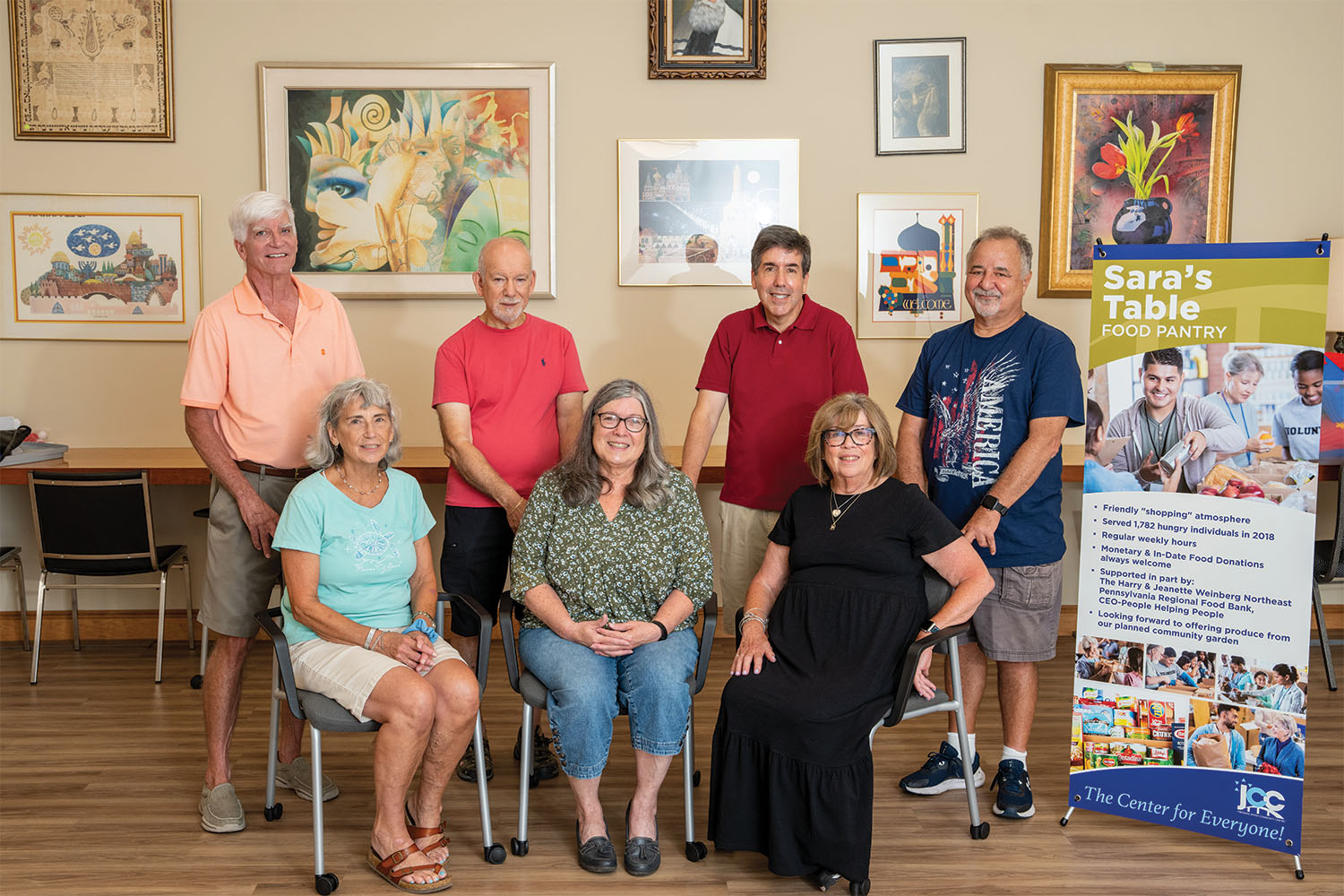
The JCC also runs a free senior congregate meal program, providing lunch five days a week for those in need. Bernstein recalled while the facility was closed members would eat the packaged lunches in their cars with their windows down so they could eat together. “The thing they liked the most was the socialization,” he said. “Before, they would come in and eat together here, but during the pandemic we gathered the meals, brought it to their car and some of them stayed to talk with their friends.”
Bernstein emphasized the true meaning of community was really felt during those times, especially in the way staff stayed connected with members. “We spent a lot of time asking how we can stay in touch with our members,” he said. “I had every employee take a page of names and numbers and call them every week to check in, asking ‘How are you doing? How are you surviving? Are you getting enough food? Do you need help getting prescriptions or whatever it may be?’ We called young and old.”
Because of this ongoing connection and relationship, Bernstein said they hardly lost any members during the pandemic. “I don’t think we lost five members and it’s because we kept servicing them and we kept giving them value for their membership. I’m very proud of that,” he said.
And the JCC plans to keep providing value for membership with its latest capital campaign, “Building a Brighter Future.”
Building a Brighter Future
The JCC’s newest endeavor is a $4 million capital campaign to invigorate the summer day camp experience with new program enhancements and much needed property improvements.
“The JCC Day Camp sits on top of a secluded hill overlooking Harvey’s Lake about 30 minutes from our main building,” described Bernstein. “It’s a sprawling paradise, especially for children, and an invaluable resource for the whole community, but it desperately needs some attention.”
When Bernstein came to the JCC, there was a discussion about selling the campsite and putting the money into the new building. However, he saw the site as a beautiful asset and rather than selling it, realized they should improve it. To get started, they put together a vision team and brought in people from the community — non-members, lawyers, attorneys, architects and people who just love camp — and asked how they could turn the campsite that was only being used eight weeks out of the year into a year-round activity and resource that could generate revenue.
“We’re thinking like an entrepreneur and thinking of areas where we can generate money that maybe is nontraditional to JCCs or JCC day camps,” added Bernstein. “That’s the kind of mindset we have.”
Bernstein noted how popular basketball and indoor sports are in their region. That’s why one of the key renovations will include a new gymnasium, in addition to upgrades to the existing Rosenberg Gymnasium. “People travel hours away from here to go to basketball events, whereas if they stayed here, we could generate revenue,” he said. “We thought if we built an additional gym we could have the basketball tournaments here every weekend, all year long.”
The JCC has been working with the state senator and representative who helped lobby the government and received $2 million in state funds toward the campaign. With this — in addition to private donations, grants and foundational support — the JCC has raised almost $3 million toward its $4 million goal. “I know it’s just going to be the tip of the iceberg,” said Bernstein. “That’s not going to give us everything we need or want but it’s certainly going to make it a lot better than it is. The community understands it’s a great facility and it could be even greater.”
Overall, Bernstein concluded his role leading the JCC really is all about connecting with the community. He added the traditional ideas of just running teen, senior and youth programs are over.
“You have to connect with the community, go where people are and not wait for them to come to you,” said Bernstein. “If there’s a key component of success in JCCs, universities, community rec centers, etc. it’s developing relationships — people giving to people and good causes, too.”
Hear more from Gary Bernstein on the Causenetic Podcast with hosts Keith Vinson and Rodrigua Ross of the YMCA of Metropolitan Dallas.


